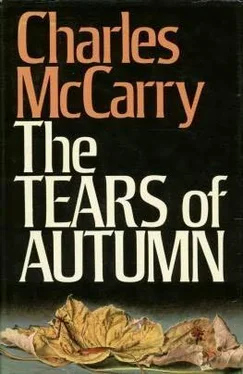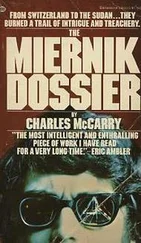Christopher paid the impassive waiter and walked away. The unlighted streets were deserted except for an occasional Congolese, asleep in the dirt. By day, the concrete buildings, painted white or rose or pale blue like the Belgian sky, showed tropical sores and lesions. Now they were dark shapes, too geometrical to be natural, but emitting no more light than the forest that lay a few hundred yards away. Christopher walked in the middle of the street, to avoid the doorways. When he looked back, he saw the faint reflection of the fire in the high branches of the tree by the café.
It was too dark to see the river, but he could hear it. A power launch passed, showing no lights, and Christopher heard the canoes rattling at their moorings in its wake. He walked along the bank until he saw the outlines of a river steamer; it had once been white and its blunt stern was clearly visible against the sky. Christopher, leaning against a piling, waited until he saw a tall man go aboard the steamer. Then Christopher climbed the gangplank, crossed the deck, and went down a ladder into the interior of the boat. A candle burned in a stateroom at the end of a narrow gangway, and Christopher walked toward its nervous light. He heard Nsango behind him, and stopped.
“My friend,” Nsango said.
Christopher turned around. The black, wearing the khaki shorts and torn singlet of a workman, embraced him. He took Christopher’s hand in his own dry fingers and led him to the stateroom.
“I’m sorry to make you wait,” Nsango said. “Did you come every night?”
“Yes,” Christopher said. “Four times, but I never saw the light.”
Nsango laughed. “I was in the bush. I was waiting, too. But I knew you would come back tonight. I saw you in the café, reading your book.”
“Yes, I saw you across the boulevard.”
“Ah, what eyes!” Nsango spoke rapid French at the back of his throat, with many extra m sounds as if his own language struggled to reveal itself. “Well, what news?”
“The Congolese think you’re in Angola. Someone told the Portuguese you were camping along the frontier, and they told the police.”
“Are they looking for me there?”
“They’re watching the crossing points.”
“Good. I’ll go the other way.” He laughed again.
“How did you explain this journey?”
“I told them in the camp that political organization was needed in some villages I know about. They probably think I have a woman somewhere.”
“What’s going on in Katanga?” Christopher asked.
“It’s very quiet, my friend. I lose five or six men a week- they go back to their villages.”
“Do you tell them to go?”
“Yes, they’ll wait for me there. They don’t like the new foreigners.”
“There are new foreigners?”
“Yes, the Chinese have all gone away. They took their aspirin that made men bulletproof with them. But now we have others-some of them are black men.”
“Stop talking like a native, Nsango. Who are they?”
Nsango guffawed. “They fell from the sky on great white leaves, master. Oh, we were frightened!”
Christopher had seen this man, who had the best political brain in black Africa, trembling in fear because he believed a spirit had entered his body as he slept; he felt it devouring his liver like a maggot. Christopher had brought a juju man from the Ivory Coast and he removed the spirit, sending it into the body of the man who had cursed Nsango. Christopher had given the juju man fifty ounces of gold for his work. He and Nsango had used the sorcerer again to carry out an operation they hoped would result in Nsango’s becoming, in time, the prime minister of his country. They failed, and Nsango had gone back into the forest. Christopher knew he would never come out again, and Nsango, despite his diploma from the Sorbonne and his name that was known throughout the world, still feared enchantment and blamed it for his bad luck. Nsango was not, however, afraid of foreigners.
“They’re Cubans,” he told Christopher. “Three blacks, four whites.” He removed a stained envelope from the pocket of his shorts and handed it over. Inside was a roll of film and a sheet of paper on which the names the Cubans used were written in Nsango’s neat missionary-school hand.
“When did they come?” Christopher asked.
“Maybe a month ago. First there was this one.” Nsango pointed at the sheet of paper. “Manuel. He speaks good French. Then the others a few days afterward.”
“How did they find you?”
“I suppose the Chinese told them.”
“What do they want?”
“A revolution. They talk even more than the Chinese-we have meetings all the time. The men like it, there’s a lot of beer, and they brought some very good guns.”
“How many?”
“Ah, my friend, not so many. Some mortars. Not enough ammunition.”
“Are they issuing the weapons to your men?”
“No, they’re like the Chinese were at first. We must make our own weapons to make our own revolution. Spears and stones-Mao’s teachings. We killed a South African for them- the capitalists have that mercenary camp still outside Elisabeth-ville. We ambushed a jeep, the whites were drunk. One got away-he had a machine pistol, so we didn’t chase him.”
“Are you going back?”
“Yes, I’m the leader. We need the guns. The Cubans won’t stay forever.”
“Nsango, I think you’re taking a chance.”
“It’s better than prison. What do they say about me in the papers?”
“In Léopoldville, nothing. But I see your name written on walls all over town: everyone believes you’re alive. In Brussels, that your movement still is dangerous, and that you are more so.
“What would you do about these Cubans?”
“Let them stay,” Christopher said. “It’s better to have someone you know than to wait for someone you don’t know to show up.”
Nsango picked up the candle and held it next to Christopher’s face so that he could watch his expression as he answered the question Nsango always asked.
“You still think I have no chance?”
“I don’t say that. I can’t help you-you have the wrong allies.”
“But if, after all, I win, you’ll be my friend, and your friends will expect me to remember past favors?”
“That’s what they’ll expect,” Christopher said. “They’re not always realistic.”
“We’ll see. When will you come back?”
“I don’t know. If you want to see me, send a postcard. The one with the elephants if it’s urgent. I’ll use a postcard with a picture of Pope John. I’ll come to Elisabethville on the sixth day after the postmark, ten o’clock at night. I don’t think you should come to Léopoldville again-at least, not to meet me.”
Christopher took a key out of his pocket and gave it to Nsango. “Deposit box 217, Banque de Haute Katanga, Elisabethville,” he said. “In case you need it, there’s a ticket to Algiers, a thousand dollars, and a passport with a visa for Algeria. It’s a Camerounian passport, so don’t go there.”
“What good would I be to the movement, or to you, in Algiers?” Nsango said. “The old soldiers’ home for revolutionaries.”
“What good would you be dead?” Christopher asked.
Trevor Hitchcock knocked on the door of Christopher’s hotel room at six in the morning. He was the son of missionaries, and he had spent his childhood in the Congo; he worked in the morning, slept in the afternoon, and drank through the night. His Presbyterian father had taught him to make no concessions to the climate and Hitchcock never went out in the sun without a coat and a tie and a Panama hat.
“Father made more converts than anyone in Kasai province,” Hitchcock once told Christopher. “He thanked God for smiling on the Presbyterians. Then he learned, after about five years, that it was because he sweated like a hog butcher in his black suits and his celluloid collars. The Congolese thought he smelled like a human being-the other missionaries, who wore shorts and took baths, smelled dead to them. That’s what whites are called in the Lingala language-the dead.”
Читать дальше












